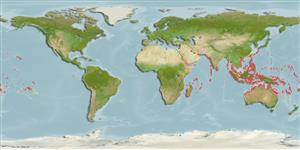Common names from other countries
Environment: milieu / climate zone / depth range / distribution range
экология
ассоциированный с рифами; пределы глубины 3 - 10 m (Ref. 98622). Tropical; 30°N - 34°S, 27°E - 135°W (Ref. 846)
Indo-Pacific. Tropical to subtropical.
Length at first maturity / Size / Вес / Возраст
Maturity: Lm ? range ? - ? cm Max length : 19.9 cm BRL самец/пол неопределен; (Ref. 269); common length : 2.5 cm BRW самец/пол неопределен; (Ref. 269)
A corymbose growth form distinguishes this spcies. Individual branches form fat fingers, 0.1-0.25 cm in diameter and less than 20 cm in length, with little secondary branching. Due to solid construction, these species is found on exposed reefs throughout its range in shallow to intermediate depths (Ref. 269).
Life cycle and mating behavior
половая зрелость | размножение | нерест | икра | Fecundity | личинки
Hermaphroditic (Refs. 113708, 113712). Mature gametes are shed into the coelenteron and spawned through the mouth. Life cycle: The zygote develops into a planktonic planula larva. Metamorphosis begins with early morphogenesis of tentacles, septa and pharynx before larval settlement on the aboral end (Ref. 833).
Основная ссылка
ссылки | координатор | соавторы
Wallace, C.C. 1999. (Ref. 86439)
Статус Красного Списка МСОП (Ref. 130435: Version 2024-1)
Статус СИТЕС (Ref. 108899)
Not Evaluated
Использование человеком
| FishSource |
инструменты
дополнительная информация
Возраст/РазмерыростЗависимость между длиной и массой телаЗависимость между длинамиморфологияличинкичисленность
ресурсы в Интернет
Estimates based on models
Preferred temperature
(Ref.
115969): 24.9 - 29.3, mean 28.4 (based on 3133 cells).
Уязвимость
Low vulnerability (10 of 100).
Категория цены
Unknown.
